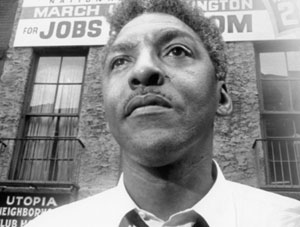Brother Outsider
This month saw the centenary of the birth of the great Bayard Rustin. He has long been a political inspiration of mine, but I think he is a good guiding light for our times now. Two appreciations of him in particular resonated with me. Richard Kahlenberg:
Rustin’s seminal 1965 article in Commentary, “From Protest to Politics: The Future of the Civil Rights Movement,” suggested that with passage of civil-rights legislation having destroyed “the legal foundation of racism,” it was necessary to take on issues of class inequality that continued to weigh down many African Americans—and low-income people of other races as well. With blacks constituting just one-tenth of the U.S. population, they needed allies, Rustin said, as he called for reinvigorating the March on Washington coalition of “Negroes, trade unionists, liberals, and religious groups.”
As “I Must Resist,” makes clear, Rustin opposed racial-preference programs in part because they would sunder this progressive coalition. He wrote in a 1974 letter: “to transform the demand for Negro rights into a call for the displacement of whites would inevitably elicit instantaneous and widespread resistance from a society otherwise disposed to view the civil-rights agenda favorably.” He argued, “weakening the merit principle and legitimate standards does no benefit to society, least of all to minorities.” Rustin knew that lower-middle-class whites were a swing vote in America, and that “the question is not whether this group is conservative or liberal, for it is both, and how it acts will depend upon the way the issues are defined.” Racial preferences encouraged working-class whites to vote their race, not their class.And Eric Lee:
Rustin moved in the same circles as Max Shachtman, and eventually shared Shachtman’s views on issues like the Vietnam War. While many on the left supported a Communist victory in Vietnam, seeing Ho Chi Minh as some kind of Vietnamese George Washington, Rustin took a more nuanced view, and supported a negotiated settlement that might result in an American withdrawal from the country without necessarily giving Ho control of the south.
When the North Vietnamese army triumphed in 1975, Rustin spoke out at small, hastily-organized demonstrations called to highlight the plight of the “boat people”.
Rustin, like his mentor, the legendary A. Philip Randolph, was a lifelong supporter of the trade union movement. He set up the A. Philip Randolph Institute which for decades served as the centre for Black trade unionists and build strong ties between the Black community and trade unions. And he did this despite the overt racism of many of those unions — a racism he fought against from within the movement, and not as an outsider.[...]
Like most Black leaders in the US in the early 1960s, Rustin felt very close to the Jewish community and the state of Israel. The bonds formed in the early days of the civil rights movement between Blacks and Jews were still quite strong. When this became unfashionable following Israel’s victory in the 1967 Six Day War and a bitter teachers’ strike in New York City, Rustin remained firm in his beliefs. As tensions increased between the Black and Jewish communities, Rustin organized the Black Americans Support Israel Committee (BASIC) and continued to push for reconciliation between the two communities.[...]Eric continues with a story from 1974, of Rustin speaking against "tribalism" to some student radicals:
It was not fashionable to oppose Black separatism back then, in the early 1970s. But Bayard Rustin never gave a damn about being fashionable.



Comments
While I wouldn't saw Rustin was right about everything, the article by Michael Barker (I have no idea who he is or what Swans.com is*) seems to me tendentious in its criticism of Rustin.
- It is bullshit that Rustin "demonstrated a strong propensity to serve elite interests". He continued to argue for social justice and redistribution of wealth and against capitalism all his life. He argued that class is more fundamental than race in creating a divided, unequal society. He had a class analysis, not some half-baked "anti-elitist" attitude.
- "Thus in the 1970s he served as a vice chairman of the CIA-linked International Rescue Committee". Er, that's the CIA-linked IRC that was founded by Albert Einstein, whose arguments for socialism Swans.com displays on its frontpage. The IRC was funded indirectly and covertly by the CIA in the Cold War, but then so were quite a large number of democratic socialists and even anarchists. I might be wrong but I think IRC's CIA funding came via the Ford Foundation, which of course has also funded Democracy Now!, Fairness and Accuracy in Reporting (FAIR), Mother Jones, South End Press and Z Magazine, presumably all also serving "elite interests".
- "in 1975 he organized the Black Americans to Support Israel Committee": what a horrific crime, at a time when Israel had a socialist government and was under attack by right-wing Arab nationalist regimes and corrupt monarchies.
- "and then in 1982 he "helped found" the National Emergency Coalition for Haitian Refugees (alongside then president of the AFL-CIO, Lane Kirkland)": another horrific crime, to fight for the rights of Haitians fleeing Duvalier's regime denied the right of asylum by the Reagan government
-"Later still Rustin served as the president, and then co-chair, of the conservative A. Philip Randolph Institute". Er, that's the black trade unionist A Philip Randolph Institute named after lifelong out Socialist.
Is all that evidence for serving elite interests? Please...
Swans is unusual and seemingly fairly bland until you use their search facility, which revealed this section:
http://www.swans.com/library/subjects/israpal.html
With typical nonsense from Herman.
http://michaeljamesbarker.wordpress.com/thesis-outline/
Peep the final section, "Rejection Letter".
autographs